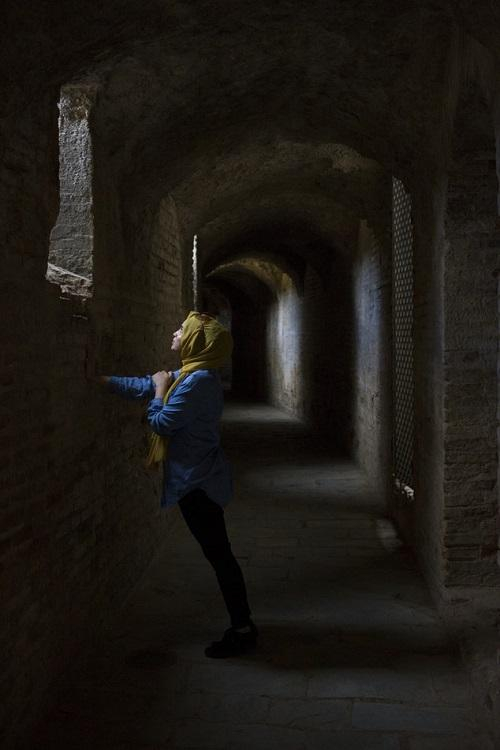Spring Cleaning Your Intentions and the Islamic Concept of Repentance
Faith
|
Mar 16, 2020
|
9 MIN READ

By Danah Shuli
Who among us hasn’t struggled in our faith, making mistakes and wondering if we can be forgiven? The concept of repentance in Islam is an ongoing theme, one that is mentioned numerous times in the Quran. Allah (S) on several accounts calls to us, His servants, to seek refuge in Him from the sins we have committed so that He may forgive us.

He calls on us to make du’a so that He may answer it. He reminds us time and time again that He is Al Rahman, the most merciful, Al Tawab, the acceptor of repentance, Al Afuw, the forgiver, and yet it seems like so many of us struggle to find it within ourselves to get back up once we have fallen off the path to finding Allah (S) and seeking the hereafter:
Do they not know that it is Allah who accepts repentance from His servants and receives charities and that it is Allah who is the Accepting of repentance, the Merciful? [9:104]
As we enter the spring season and are all grappling with the shutdowns, social distancing and life changes that are coming the coronavirus pandemic, it feels fitting to reflect on repentance and the renewal of our faith as a vision of not something that is already perfected or maybe impossible to achieve, but rather as a work in progress – where just as we find hope and a path forward in the uncertainty of life around us, we can seek Allah’s (S) mercy on our journey of worship.
The Illusion of Perfection

If you take a moment to analyze your surroundings, it’s not hard to realize that we live in a day and age that glorifies perfection. Social media and society tells us that we have to conceal our imperfections; we have to show the world our picture perfect lives by only talking about our achievements, only posting the perfect photo using filters and Photoshop while tucking away our realities. Even when things are difficult or in times of crisis, sharing our raw, truthful and imperfect selves can be difficult. In fact, the way many of us have been taught Islam is often centered around this idea of perfection.
From a young age, many of us have been taught that if we mess up, the consequence is hellfire. Naturally, this has brought about the desire to be perfect in the way we practice our religion. We raise individuals who hold a high rank in our Muslim communities on a pedestal and see them as “the ideal Muslim.” We may feel as though we are not worthy of Allah’s mercy or forgiveness unless we have reached perfection in the way we practice our faith.
Why is it that we worry about perfection in our worship rather than realizing we can seek repentance from Allah (S) when we fall short? A classic example of this is when a Muslim woman may think about wearing the hijab. Often times, many end up not wearing it in fear that they will eventually take it off or not be able to commit to it. Or, they may think other areas of their faith life may not be perfect (like regular prayers), so how can they think of wearing hijab? But, why is it better to not wear the hijab at all, (or to pray at all, or to fast at all), than to try? Even if you may eventually take it off (or stop praying for a time being)?
In other words, do we need to be perfect in some areas of our faith in order to move on to others? What if we've never been consistent in our prayers and feel like doing so now? Is it too late? Or, must prayer be perfect before we start fasting? And fasting be perfect before we consider ourselves worthy of going for Hajj? Is faith a ladder where you can only climb in one direction, one rung to the next?
In a word – no.
In order for us to break this cycle and way of thinking, the first step to repentance and the intention to start over is the realization that we are human, and humans commit sin. Islam is not an “all or none religion.” It is not a religion of perfection, nor were we created to be perfect worshippers of Allah (S).
We were created as humans; it is in our nature to sin, to go astray. If Allah (S) wanted us to be perfect, wouldn’t He have created us as angels instead? It is narrated by Abu Huraira that the Prophet (SAW) said: “By Him in whose hand is my soul, if you did not sin, Allah would replace you with people who would sin and they would seek forgiveness from Allah and He would forgive them.”
The Prophet (saw) tells us that, “All of the children of Adam are sinners, and the best sinners are those who repent.” We should not go out of our way to sin in order to seek repentance but rather, when we do fall short, we must realize that this is part of our nature as humans and that Allah (S) is waiting for us to turn to Him and seek His forgiveness.

The Whispers of Shaytan
The concept of perfection is a deceptive illusion, one that shaytan (the devil) uses so well to feed into our thoughts of not being good enough to start over and get back on the right path. A deep internal conflict arises when you think you were supposed to be perfect or even just good at something, but have made a mistake or fallen astray. You may stop trying and fall into despair and hopelessness.
We start asking ourselves “So what’s the point? I’m never going to be the perfect Muslim anyway.” Or, “What’s the point in wearing hijab?” “What’s the point in praying or fasting or going to the masjid?” You start to lose hope, stop trying, stop striving to please Allah (S). How many times have you heard someone say - or maybe even you thought to yourself – “Why is (or isn’t) she doing that? She might as well take off her hijab?” Take a moment to ponder on this statement. What are you really saying? You’re basically telling someone that she wasn’t good enough, she wasn't the “perfect, flawless hijabi,” so she should stop trying all together.
This is exactly the narrative that shaytan is whispering into your head. When we feed into this attitude, we are supporting shaytan in his mission to drag us all down as he promised Allah (S) he would do."By your might, I will surely mislead them all. Except, among them, Your chosen servants." [38: 82-83] Shaytan will even go as far as making you doubt your own sincere actions in order to get you to give up and stop trying.
Have you ever questioned your sincerity when trying to do a good deed? Have you ever thought to yourself that you are only volunteering or giving charity just so people can speak highly of you? These whispers from shaytan make you question your own acts of worship, and you may start to think that you should stop doing these things because maybe you are selfish in your actions regardless of how many times you renew your intentions. Shaytan knows we can’t be perfect, and hence he will always come to us with this deceptive tool of “If you can’t be perfect then just don’t do it at all.”
When you find yourself giving into these doubts about your actions, take a moment to reflect on your acts of worship and renew your intentions. Spring comes as a time of renewal and rebirth. The flowers start to bloom, the trees start to blossom and the animals come out of hibernation. Why not take advantage of this time of awakening and use it as a spiritual recharge to help us take on a new outlook on the way we are practicing our faith?
With Ramadan around the corner, this is also the perfect time for us to sit down with ourselves and make a list of what we would like to achieve this year in terms of worship. Remember - taking small, regular steps towards Allah (S) is much more beloved to Him than performing intermittent big acts of worship. The Prophet Muhammad (SAW) reminds us of this in the beautiful hadith narrated by Abu Huraira: “Take up good deeds only as much as you are able, for the best deeds are those done regularly even if they are few.”
The Path to Allah (S): The Highs and Lows

Just like with many aspects of our life, the path to Jannah and pleasing Allah (S) is not a smooth and easy one. There will be times when we have our highs - moments of spiritual awakenings and bursts of energy to do good deeds and worship more, an “iman high” as many people like to call it. During these times, it becomes easy for us to wake up for fajr, attend Islamic lectures, pray sunnah, volunteer and help out in the community. As a result we may even start to feel a sense of accomplishment or achievement that may lead to arrogance and looking down at others when we do not feel like they are practicing Islam the way we are.
This can lead us down a dangerous slippery slope. During these times it’s important to remind ourselves that again, no matter the level of iman we think we have reached, it will never be perfect. And even at our best, we will still fall short and need to renew our intentions and seek Allah’s (S) guidance and mercy.
There will also, inevitably, be times when we will hit a low – times when we feel discouraged and unmotivated. It is during these dips in our path to spiritual guidance that we must not give in to the whispers of shaytan. And, how we respond to these “iman lows” that helps to determine how we stay within our faith. Will you choose to repent and try again to get back to doing what is right, or will you give in to the whispers of shaytan, fall into despair and give up on your faith?
We are reminded in the Quran of the story of Adam and shaytan, both of whom sinned, but there is a distinct difference in the way they reacted to their mistake.
Not only did shaytan refuse to bow down to Adam when Allah (S) commanded him to, he also challenged Allah (S) and refused to repent, digging deeper in his disobedience. Conversely, Prophet Adam (pbuh) admitted to the mistake he made and asked for Allah’s (S) forgiveness. "Our Lord, we have wronged ourselves, and if You do not forgive us and have mercy upon us, we will surely be among the losers." [7:23] This is the true path to salvation - acknowledging the need for Allah (S) during our times of disobedience.
One of Allah’s (S) most emphasized qualities is that He is Al Rahim, the most merciful, the most compassionate. He will always be there to forgive us as long as we go back to Him and repent. “Say, ‘O My servants who have transgressed against themselves [by sinning], do not despair of the mercy of Allah . Indeed, Allah forgives all sins. Indeed, it is He who is the Forgiving, the Merciful.’" [39:53]
Our challenge is to continue worshiping Allah (S), even when it becomes a struggle to do the most basic acts of worship like salah or fasting. With the freshness of spring before us, let’s take this time to not only clean and renew our homes and gardens but also start fresh and renew our faith. Just as we like to take care of our homes by doing some spring cleaning, our faith and hearts also need to be taken care of.
And, just like things Insha’Allah pick back up again in your personal life, your spiritual low will turn back into a spiritual high, and the cycle will continue. This is the life of a believer. Our life on this earth is always going to be a constant struggle to do what is right, to stray from temptations and desires and to obey Allah (S).
We will be tested, and we will sometimes sin. But the best amongst us are those who repent and seek Allah’s (S) forgiveness and His protection from our own selves, our weaknesses and of shaytan. The Prophet Muhammad (SAW) reminds us in this beautiful hadith: “All the sons of Adam are sinners, but the best of sinners are those who repent often.”


Subscribe to be the first to know about new product releases, styling ideas and more.
What products are you interested in?

